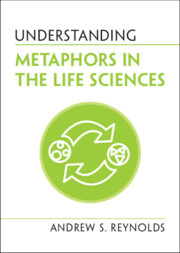Book contents
- Understanding Metaphors in the Life Sciences
- Series page
- Understanding Metaphors in the Life Sciences
- Copyright page
- Additional material
- Dedication
- Contents
- Foreword
- Preface
- Acknowledgements
- 1 Metaphors and Science
- 2 Background Metaphors
- 3 Genes and Genomes
- 4 Proteins
- 5 Cells
- 6 Evolution
- 7 Ecology
- 8 Biomedicine
- Concluding Remarks
- Summary of Common Misunderstandings
- References
- Index
6 - Evolution
Natural Selection, the Tree of Life, and Selfish Genes
Published online by Cambridge University Press: 11 April 2022
- Understanding Metaphors in the Life Sciences
- Series page
- Understanding Metaphors in the Life Sciences
- Copyright page
- Additional material
- Dedication
- Contents
- Foreword
- Preface
- Acknowledgements
- 1 Metaphors and Science
- 2 Background Metaphors
- 3 Genes and Genomes
- 4 Proteins
- 5 Cells
- 6 Evolution
- 7 Ecology
- 8 Biomedicine
- Concluding Remarks
- Summary of Common Misunderstandings
- References
- Index
Summary
While other scientific-technological developments may have had greater material impacts on how we live (for instance, the unleashing of fossil fuels to drive the industrial revolution, atomic energy, or the creation of digital computers), none has had a greater impact on how we understand what it means to be human and our place in the universe than the Darwinian theory of evolution. Darwin was not the first to propose that humans and other species have not always existed in their present forms, and that they have gradually developed or emerged from earlier forms of life. Theories about the “transmutation” or “transformation” of species were proposed in Europe by members of his grandfather’s generation, including Lamarck, Geoffroy Saint-Hilaire, and Darwin’s own paternal grandfather Erasmus. In his own time, people like Robert Chambers and Herbert Spencer wrote popular and philosophical essays espousing what was frequently called the hypothesis or principle of development.
Information
- Type
- Chapter
- Information
- Understanding Metaphors in the Life Sciences , pp. 88 - 116Publisher: Cambridge University PressPrint publication year: 2022
